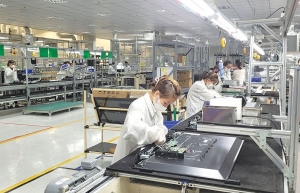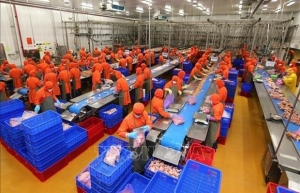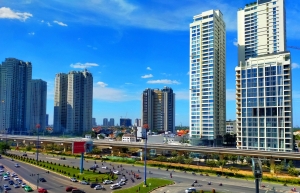Potential global drawbacks to keep in mind for economy
 |
| Brian K. Langenberg Principal, Langenberg & Company |
Much of this has already shown up in lower stock prices and a drop of 8.1 per cent in VND to USD as of November 3. Further weakness can be expected as the US and Europe both likely enter recession and China slows owing to internal decisions that continue to drive capital and business elsewhere. This will adversely affect an already cooling Vietnamese real estate market.
Bad US monetary and fiscal policy has put the country in a position of heavy debt and a 4 per cent interest rate, while inflation runs at 7-8 per cent. Investors tolerate negative real return of (3-4 per cent) when only there are no suitable alternatives and the free lunch is war premium.
Failing to raise interest rates since 2013-2014 drove another home price bubble. Meanwhile, the pandemic became a $7 trillion excuse for printing money that mostly flowed into speculation in stocks and real estate. The US now owes $80,000 for every man, woman, and child. At 1.5 per cent, debt service is $1,200 per person; at the current 4 per cent, it is $3,200. Also, inflation is running 7-8 per cent and so holders of US treasuries are willing to accept negative real returns of 3-4 per cent.
We see no major US asset class as attractive, home prices are falling, and the trade weighted dollar is near its 20-year high. And the damage is multi-year.
Conflict is another important factor. The US government has put over $80 billion and advisors into Ukraine. Western European governments are along for the ride and European politicians are just starting to figure out that energy security trumps energy transition; when it snows, this will become painfully obvious.
Spillover effects near-term are difficult to predict. For example, de-risking the global semiconductor supply chain has significant, sustainable, bi-partisan support in the US and is a trend that will only accelerate as Europe increasingly addresses its own industrial footprint.
Institutional investors have few options. Germany’s model of low military spending, cheap Russian gas, and selling to China is coming home to roost and its political and business classes have yet to step up.
If Germany is struggling with inadequate energy supply, Japan is in even worse shape and is experiencing a 40 per cent currency decline, with the Bank of Japan being the primary buyer of its bonds.
What can Vietnam do about it? The country is well positioned because of economic liberalisation in recent decades, growing population, and improving education.
China’s increasing retrenchment towards a centralised, state-owned economic approach creates further opportunities to capture frehs investment as well as potential availability of funds seeking to leave that country altogether.
The path to prosperity starts with logistics in moving up the value chain from assembly to fully developed in-country and in-region supply chains. Post-secondary education – both university and skilled trades – are a can’t miss.
As one example, the global aerospace sector is seeking to de-risk from China and is screaming to find more labour and what they need is machinists and welders. Business models that address mass market education needs should do particularly well.
 | Quang Ninh working to attract new-generation FDI inflows The northeastern province of Quang Ninh has strengthened to attract new-generation foreign direct investment inflows to implement its greener economic development strategy, helping it become a top manufacturing and processing industry hub for Vietnam. |
 | FDI inflows reach 22.46 billion USD in 10 months Foreign capital inflows fell whereas disbursed capital rose in the first 10 months of 2022, according to the Foreign Investment Agency (FIA) under the Ministry of Planning and Investment. |
 | Real estate holds 2nd spot in FDI Although the domestic real estate market has faced certain difficulties in recent years, foreign investors have continuously poured capital into the field. |
What the stars mean:
★ Poor ★ ★ Promising ★★★ Good ★★★★ Very good ★★★★★ Exceptional
 Tag:
Tag:
Related Contents
Latest News
More News
- Cashless payments hit 28 times GDP in 2025 (February 04, 2026 | 18:09)
- SSIAM and DBJ launch Japan Vietnam Capital Fund (February 04, 2026 | 15:57)
- Banks target stronger profits, credit growth in 2026 (February 04, 2026 | 15:43)
- Vietnam on path to investment-grade rating (February 03, 2026 | 13:07)
- Consumer finance sector posts sharp profit growth (February 03, 2026 | 13:05)
- Insurance market building the next chapter of protection (February 02, 2026 | 11:16)
- NAB Innovation Centre underscores Vietnam’s appeal for tech investment (January 30, 2026 | 11:16)
- Vietnam strengthens public debt management with World Bank and IMF (January 30, 2026 | 11:00)
- Corporate bond market poised for stronger growth cycle (January 28, 2026 | 17:13)
- Vietnam's IPO market on recovery trajectory (January 28, 2026 | 17:04)






















 Mobile Version
Mobile Version